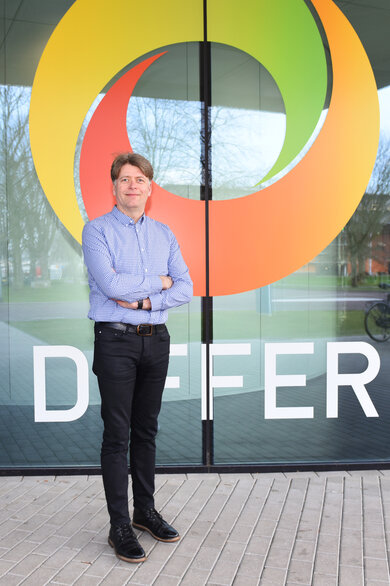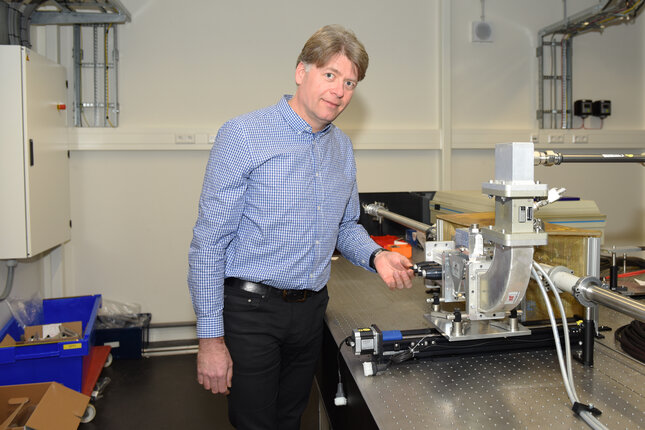Gerard van Rooij, part-time professor Solar Fuels (March 2018)
I like to contribute my bit to make students enthusiastic about Applied Physics
The Eindhoven University of Technology has a strong bond with the industry and that is reflected in the collaborations that result from this. In 2016, the university had 123 part-time professors, all of whom have their main function in business or with social institutions. This number continues to rise. Gerard van Rooij is one of the new part-time professors.
On the university campus, the Flux building, home of the Applied Physics faculty, is closely connected to the Differ research institute. Not only physically with a walkway and students conducting research for the institute, but recently also by Gerard van Rooij, part-time professor Solar Fuels. “My research for Differ is mainly focused on releasing an oxygen atom from CO2 using plasma. The resulting carbon monoxide can serve as the basis for a liquid fuel. In an indirect sense, you can make a solar fuel as long as the electricity with which the plasma is created has been generated with sunlight. On this subject, I already taught a guest lecture at the university and supervised PhD students with research in my field. Now I am a part-time professor, I am even more involved.”
"In the long run, it is also important for the industry that the projects we do at Differ have an embedding in the academic field of the university."
Viable research
“My part-time professorship is a good development in several areas. For the university, it means a more intensive connection with Differ and the university has now more knowledge on solar fuels available, so further development on this subject is possible. There is also a mutual interest because there are more internships and graduation opportunities for students at Differ. And as a part-time professor, I also act as a responsible lecturer. Teaching is important to me because I can involve students in the research that I do. That is sort of giving viability to the research. If you do not interest students and educate them in that direction, you may wonder whether the research has a right to exist. I like to contribute my bit, from my specific point of view, when it comes to making students enthusiastic about Applied Physics."
Kickstart
“The Differ research institute has, among other things, been set up with the idea that if we create an institute for fundamental research within the energy theme, a national contact point for industrial parties will be created. In practice, that is of course a lot more nuanced. The way TU/e approaches solar fuels, with me at chair level with the link to the plasma group, is new. This will give the solar fuels research a kickstart. Thanks to this part-time professorship I can bring the industrial partnerships that I already have with me to the university, while at the same time strengthening my relationship with the industry and the students. In the long run, it is also important for the industry that the projects we do at Differ have an embedding in the academic field of the university.”

Convert energy into fuel
“In its content, research on solar fuels captures the imagination. What we have always done is combusting fossil fuels and taking energy out of them. We realize that this is sub-optimal in a number of ways. Think of the concerns about climate change and from a European perspective, being able to be energy independent. Part of the solution is generating electricity by solar panels and windmills. When that happens on a large scale, in some places it is already happening, you run into the problem that you cannot always use the energy electrically, at that moment and location. Then you need a translation where you need to turn energy into a fuel or a form in which you store it in a chemical way. So we make of CO2 a valuable product again that is very interesting for industries.”
Future perspective
“For the research into solar fuels is a lot of interest from the industry, like fuel producers and distribution network operators. They are aware of the fact that their business case is likely to change in the future. Our relationship with these companies really contributes to the development of solar fuels. The specific plasma approach is a flagship of Differ. We are unique in this, both with regard to the instrumentation that we use and the critical mass we work with: with many people and many devices at the same time. By this I do not want to say that we invented the field, we base ourselves on literature, on experiments from the seventies in the Soviet Union. Internationally we are not alone. We have taken this path together with colleagues from Belgium, among others. I think that we have done it in a way that offers the most concrete future perspective, which makes people enthusiastic.”

Responsibility
“An aspect of my part-time professorship I really like: get the final responsibility for the PhD research that I am already supervising. Especially in the final phase, when the thesis is completed, there is a big role for the supervisor, and formerly that was not me. That is of course not a problem at all, but now that I am in a situation that I am involved from the beginning, have made the effort to raise money and it results in PhD research, it is wonderful that it is completed entirely under my responsibility. Actually, you do not want someone else to just put an accent in a thesis that you do not find necessary.”
"All in all, with regard to part-time professorship, there are only advantages for all parties involved. And for me personally: I am really looking forward to starting as a part-time professor."